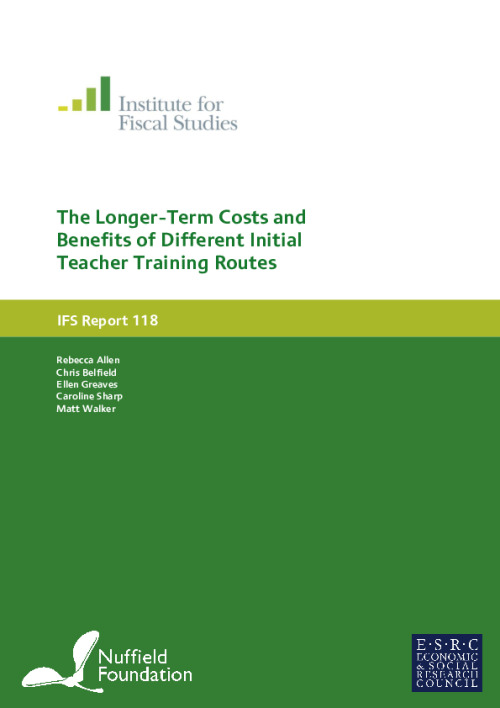Teacher recruitment and retention are increasingly challenging for schools as the pools of graduates in key subjects decline and pupil numbers grow. This report reveals around 40% of teachers who begin their initial training are not in a state school job five years later. That means of 35,000 or so individuals training to become teachers each year some 14,000 are not teaching five years later. Initial teacher training is expensive, costing an average of £23,000 per trainee taking into account costs to government and schools. The high drop-out rate means that on average more than £38,000 is spent on training for every teacher still in post five years after completing training.
This research, funded by the Nuffield Foundation, also shows how routes into teaching have changed in recent years, and looks at the costs, benefits and retention rates for each route. School-led routes have grown quickly, with ‘School Direct’ accounting for around one-third of trainees in 2015–16. Teach First has also expanded now accounting for 5% of entrants, although more than 40% of trainees are still trained through traditional university-led postgraduate courses.
Key findings from the report include:
- The average total cost of initial teacher training (including costs to central government and schools) is currently around £23,000. This, however, masks a lot of variation: from around £17,000 for primary school teachers via an undergraduate degree to around £38,000 per trainee coming via Teach First (£14,000 higher than any other route).
- 40% of those who begin teacher training are not working as teachers in a state school five years later and there is variation by route of training: around 60% of Teach First trainees have left teaching within five years.
- Higher initial costs and lower retention rates for Teach First mean that the cost per teacher in school five years after training is more than £60,000 for a Teach First recruit. This compares with between £25,000 and £44,000 for those entering via other routes. This additional cost may be justified by the fact Teach First trainees are disproportionately likely to teach in disadvantaged schools and Teach First may be able to attract graduates who would not otherwise have gone into teaching. The majority of schools involved with training believe the benefit to them outweighs their school’s cost. But the substantial additional cost does need to be weighed against these possible benefits.
- The introduction of large tax-free bursaries for trainee teachers in shortage subjects represents a significant cost. The highest bursary is now £30,000 (for physics trainees with a first class degree), equivalent to a gross salary of £39,000, which is £17,000 higher than a teachers’ minimum starting salary outside London. There is little evidence on the effectiveness of these high-cost bursaries in terms of recruiting and retaining high-quality teachers. Such evidence is urgently needed.
- Retention rates are lower where there is an excess supply of trainees. This highlights the need for local demand for teachers to be taken into account in teacher trainee allocations. Places have been allocated on a national ‘first-come first-served’ basis, which means places have not always been taken where they are most needed or by the highest quality applicants, and significant uncertainty from year-to-year.
- Teacher retention is lower in areas where the pay of other workers is higher. Our research suggests that retention is affected by the relative pay of teachers and other local workers, so national pay restraint for teachers has the potential to reduce retention.
- Most schools believe that the benefits of initial teacher training are greater than the costs for their school. A non-negligible proportion of school leaders in our survey believe that the benefits of involvement with ITT are lower than the costs, however, particularly for some routes. For example, around 30% of primary school head teachers involved with School Direct salaried reported that the benefits were less than the costs, in comparison with 6% for its predecessor, the Graduate Teacher Programme (GTP).











